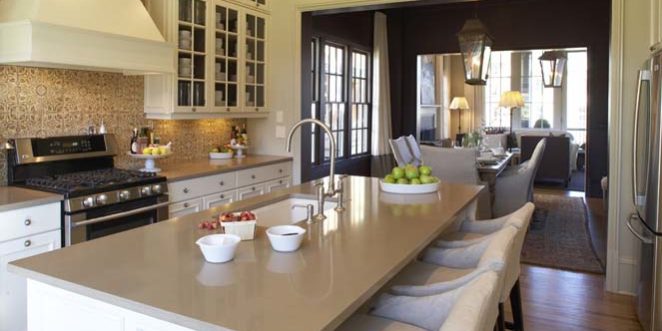Engineered quartz countertops (not to be confused with Quartzite,another appealing natural stone used as counters) is a man-made product created mostly from natural materials. It’s made of 90-94 percent ground quartz and 6-10 percent resins and pigments that are combined into durable and nonporous slabs.The strength of quartz, even in its manufactured form, makes it naturally resistant to abrasion, scratches, dents, and even acids without the need for sealants. The environmental impact of manufactured quartz is low since Quartz is an abundant material and the finished product is nontoxic and non-allergenic. It will last a lifetime, reducing the need for replacement.
Unlike solid-surface, Corian-type manufactured countertops, engineered quartz is not made to order. The product, like natural stone, is created in slabs of set sizes and thicknesses that vary by manufacturer. Caesarstone, for example, offers one slab size (56.5 inches by 120 inches) and two thickness options (0.75 inches and 1.25 inches). The slabs are fabricated to fit your projects requirements (size, shape, and edge profile) and are installed in pieces.
# Why Engineered Quartz Countertops?
Boasting the best qualities of laminate and stone (along with its own special features), quartz began appearing in U.S. homes just a few years ago after gaining popularity in Europe for the past decade. Today, quartz countertops are exploding in popularity.
Although some quartz countertops are actually made of quarried slabs of the natural stone, the new engineered material is actually created through a manufacturing process that mixes approximately 95 percent ground natural quartz with 5 percent polymer resins. The result is a super-hard, low-maintenance, natural stone-look countertop available in a dazzling array of colors. And for many of the homeowners choosing quartz, those virtually unlimited color options are what sold them.
“Color was most definitely a huge factor,” says Gay Lyons, a college professor in Knoxville, Tenn., who replaced the white laminate countertops in the kitchen of her 1970s rancher with blue quartz. “Our kitchen is part of a large area that includes dining and seating areas, as well as an adjacent sun-room. The countertops needed to coordinate with not only what was in the kitchen, but what was in those other areas as well. The color I chose coordinates perfectly.
# Choosing a Countertop
Quartz countertops allow for a variety of edging options, just like natural stone. Unlike stone, however, engineered quartz also offers other design possibilities. Quartz can be used on larger vertical surfaces like backsplashes and even shower enclosures, without the fissures and seams since it’s more flexible to work with and is held in place using glue and epoxy instead of screws,
Despite its many advantages, installation of engineered quartz countertops isn’t a job for the average do-it-yourselfer; the companies that make and sell engineered quartz certify their own installation experts.
“Installation is a bit of a pain,” says Gay. “You have to obtain it from a (certified) distributor. They send people to measure and then they send installers. There’s a bit of a wait involved between each of these steps.”
Also, because engineered quartz is significantly heavier than other stone surfaces, there are some special installation considerations. The installer also needs to be sure that the cabinets are sound.
The cost of engineered quartz countertops appears to be dropping as they grow in popularity. In general, however, they are more expensive than laminate and comparable in price to granite, ranging from $100 to $200 per square foot.
Common brand names include Cambria, Silestone, and Zodiaq, and engineered quartz countertops are now available through most kitchen design firms, as well as the major home and garden centers like Lowe’s and Home Depot.
Gay Lyons says she and her husband couldn’t be happier with their decision to go with quartz.
“We know lots of people with granite, but we don’t know anyone else who has quartz. We love the countertops. They are beautiful and indestructible.”
# Pros
- Consistent in color and texture.
- Stain-, scratch-, and acid-abrasion resistant.
- Does not require sealing.
- Won’t chip and/or crack (thanks to resins).
- Resistant to bacteria growth.
- Comes with long warranties.
# Reasons to Consider Quartz Countertops
The manufacturing process of Quartz allows a much wider range of colors than natural stones such as marble or granite. The appearance of the finished engineered stone is rich, even luxurious. Quartz’ finish has a depth that can’t be produced with solid surface materials like Corian.
Quartz has the same durability as concrete and granite but is quite a bit more forgiving, so it won’t chip or crack as easily. It doesn’t have the same hardness that some people find unpleasant.
Like other hard surface countertop materials, quartz is non-porous so it resists staining much better than granite, marble, and concrete. It stands up to juice, oil, wine, tomato, coffee and other sources of stains in the kitchen. For cleanliness, a non-porous surface means that it will not harbor bacteria or viruses. You can always be confident that you are getting your quartz countertop absolutely clean, and that’s a great benefit in both the kitchen and the bathroom.
# Summary
For a contemporary, upscale look with very low maintenance required, quartz countertops are definitely worth considering. Be aware of the few potential drawbacks and their price. If you’re willing to live with those things, quartz countertops should meet or exceed your expectations.







